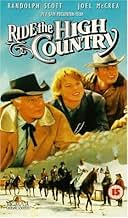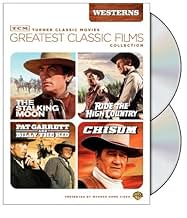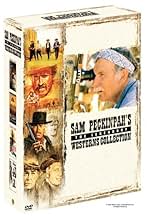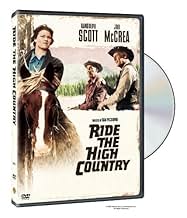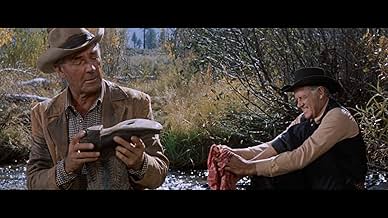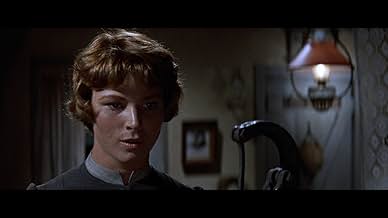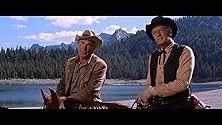CALIFICACIÓN DE IMDb
7.4/10
16 k
TU CALIFICACIÓN
Un exsoldado de la Unión es contratado para transportar el oro de una comunidad minera a través de un territorio peligroso sin que su socio y viejo amigo tiene otros planes.Un exsoldado de la Unión es contratado para transportar el oro de una comunidad minera a través de un territorio peligroso sin que su socio y viejo amigo tiene otros planes.Un exsoldado de la Unión es contratado para transportar el oro de una comunidad minera a través de un territorio peligroso sin que su socio y viejo amigo tiene otros planes.
- Dirección
- Guionistas
- Elenco
- Nominada a1 premio BAFTA
- 2 premios ganados y 2 nominaciones en total
Alice Allyn
- Candy
- (sin créditos)
George Bell
- Townsman
- (sin créditos)
Oscar Blank
- Miner
- (sin créditos)
Chet Brandenburg
- Miner
- (sin créditos)
Don Brodie
- Spieler
- (sin créditos)
Chris Carter
- Rose
- (sin créditos)
- Dirección
- Guionistas
- Todo el elenco y el equipo
- Producción, taquilla y más en IMDbPro
Opiniones destacadas
This is an important western because the subplot of a young woman's life in the remote west is addressed. At this time many women were looked upon as chattel. Here a young woman escapes farm life with an overbearing religious father who beats her, to flee into marriage with a redneck miner who beats her and plans to share her with his brothers and father. The lead character played by veteran Joel McCrea is trying to earn an honorable living because there is no pension or social security benefits for him to rely on. Randolph Scott is trying to score some easy dough to last during his retirement. A fine movie about morality, honor, and duty.
"In simple terms, Ride the High Country was about salvation and loneliness" - Sam Peckinpah
Both in their 60s at the time, Joel McCrea and Randolph Scott summed up their careers in Sam Peckinpah's second film, Ride the High Country. After two hundred films between them, this was Scott's final film and McCrea's second to last. The film was shot in only twenty-six days and played mostly as bottom filler for double bills. It was only after winning first prize at the Cannes Film Festival that it began to be appreciated for the true classic it is. Set in the early days of the century, the days of the cowpoke are giving way to the modern modes of transportation and communication. People like lawman Steve Judd (Joel McCrea), with a reputation for fierce integrity may be obsolete in the New West but his dignity and strength of character make him a hero worthy of admiration.
The film is both a lament for the passing of the Old West and a gentle celebration of humanity's search for friendship, honor, and trust. Both men feel they have somehow failed to live up to their standards and want one more chance to redeem their honor. Judd wants to recapture some measure of self-respect while Westrum looks for the material wealth that has always eluded him. As the film opens, Judd hires his ex-deputy Gil Westrum (Randolph Scott) to help him transport a shipment of gold bullion down from the high Sierras, a job in which six prior attempts ended in failure. Against Judd's advice, they bring along a third man - a wild, womanizing youth named Heck Longtree (Ron Starr), who proves to them that he can handle himself in a fistfight.
Things get complicated when they spend the night at a farm run by puritanical Joshua Knudson (R.G. Armstrong) and Heck is taken with his beautiful daughter Elsa (Mariette Hartley). Feeling thwarted by her possessive and moralizing father, Elsa runs away with the trio hoping to find a miner, Billy Hammond (James Drury) who has promised to marry her. As they ride up into the hills, the cinematography by Lucien Ballard reflects the beauty of the West as it has rarely been seen. When they arrive, things go from bad to worse for Elsa. Preceded by a marvelously comic horseback parade in which the boys sing When the Roll is Called Up Yonder, she is married to Billy in a saloon presided over by an inebriated judge.
Unfortunately, she has to be rescued by Judd after Billy Boy plans to share his bride with his four redneck brothers on their wedding night. The wedding scene is shown from Elsa's point of view and it is sympathetic and touching. On the way back with the gold, however, Gil turns on his old friend, plotting with Heck to steal the gold. In a famous exchange, Gil asks Judd, `Pardner, you know what's on the back of a poor man when he dies? The clothes of pride. Is that all you want?' To this Judd replies `All I want is to enter my house justified.' When the travelers encounter the Hammond boys waiting to ambush them at the farm, both men must confront their deepest fears and their noblest truths.
Both in their 60s at the time, Joel McCrea and Randolph Scott summed up their careers in Sam Peckinpah's second film, Ride the High Country. After two hundred films between them, this was Scott's final film and McCrea's second to last. The film was shot in only twenty-six days and played mostly as bottom filler for double bills. It was only after winning first prize at the Cannes Film Festival that it began to be appreciated for the true classic it is. Set in the early days of the century, the days of the cowpoke are giving way to the modern modes of transportation and communication. People like lawman Steve Judd (Joel McCrea), with a reputation for fierce integrity may be obsolete in the New West but his dignity and strength of character make him a hero worthy of admiration.
The film is both a lament for the passing of the Old West and a gentle celebration of humanity's search for friendship, honor, and trust. Both men feel they have somehow failed to live up to their standards and want one more chance to redeem their honor. Judd wants to recapture some measure of self-respect while Westrum looks for the material wealth that has always eluded him. As the film opens, Judd hires his ex-deputy Gil Westrum (Randolph Scott) to help him transport a shipment of gold bullion down from the high Sierras, a job in which six prior attempts ended in failure. Against Judd's advice, they bring along a third man - a wild, womanizing youth named Heck Longtree (Ron Starr), who proves to them that he can handle himself in a fistfight.
Things get complicated when they spend the night at a farm run by puritanical Joshua Knudson (R.G. Armstrong) and Heck is taken with his beautiful daughter Elsa (Mariette Hartley). Feeling thwarted by her possessive and moralizing father, Elsa runs away with the trio hoping to find a miner, Billy Hammond (James Drury) who has promised to marry her. As they ride up into the hills, the cinematography by Lucien Ballard reflects the beauty of the West as it has rarely been seen. When they arrive, things go from bad to worse for Elsa. Preceded by a marvelously comic horseback parade in which the boys sing When the Roll is Called Up Yonder, she is married to Billy in a saloon presided over by an inebriated judge.
Unfortunately, she has to be rescued by Judd after Billy Boy plans to share his bride with his four redneck brothers on their wedding night. The wedding scene is shown from Elsa's point of view and it is sympathetic and touching. On the way back with the gold, however, Gil turns on his old friend, plotting with Heck to steal the gold. In a famous exchange, Gil asks Judd, `Pardner, you know what's on the back of a poor man when he dies? The clothes of pride. Is that all you want?' To this Judd replies `All I want is to enter my house justified.' When the travelers encounter the Hammond boys waiting to ambush them at the farm, both men must confront their deepest fears and their noblest truths.
An above average Western featuring two of the genres most recognizable stars, Joel McCrea and Randolph Scott (in his last film). Both men have a history together as outlaws, but McCrea has gone straight and is now in charge of getting the gold from the mines to the bank. To help him, he hires his old friend Scott who, along with a young hothead (Ron Starr), is in town dressed up like "Buffalo Bill" and demonstrating his fancy shooting.
Scott believes he can persuade his old partner to split the gold with him before they return, and must act as a buffer between the impatient young ruffian and his old friend. While en route, the three encounter a religious farmer (R. G. Armstrong) and his under socialized daughter (Mariette Hartley), who steals away to join them.
The trouble really begins when they get to the remote mining town, encountering an inbred mountain family of hoodlums (which includes Warren Oates) and its judge (Edgar Buchanan).
Directed by Sam Peckinpah, and written by N.B. Stone Jr., it was added to the National Film Registry in 1992.
Scott believes he can persuade his old partner to split the gold with him before they return, and must act as a buffer between the impatient young ruffian and his old friend. While en route, the three encounter a religious farmer (R. G. Armstrong) and his under socialized daughter (Mariette Hartley), who steals away to join them.
The trouble really begins when they get to the remote mining town, encountering an inbred mountain family of hoodlums (which includes Warren Oates) and its judge (Edgar Buchanan).
Directed by Sam Peckinpah, and written by N.B. Stone Jr., it was added to the National Film Registry in 1992.
"All I want is to Enter My House Justified"
Sam Peckinpah's second feature film is today standing up as a must see and must own for those interested in the Western genre.
The film sees ageing lawman Steve Judd land a job of escorting a gold shipment safely to a bank in Hornitos. After running into old friend, and fellow aged lawman Gil Westrun, he hires both he and his young sparky sidekick Heck Longtree to hopefully see the job through to a successful conclusion. Yet Gil has other ideas, for where Steve is upstanding and adhering to the values he has lived his life by, Gil sees this as one last chance to actually get a big payday. The journey takes a further twist as the three men meet and then save Elsa Knudsen from a brutal marriage, it's an incident that puts them all on a collision course with the Hammond brothers.
What we have here is Sam Peckinpah's first film dealing with men who have outlived their time. We witness some emotionally poignant stuff as the two main protagonists know that they have aged beyond their world, yet as alike as they are, they have different ideals in how to deal with the advent of time. The masterstroke here is the casting of genre legends Joel McRea & Randolph Scott as Steve & Gil respectively. It's evident from the off that both men are identifying with their characters, with both men hitting top emotional form to fully realise the thematic heart of the story. Mariette Hartley makes her film debut as Elsa, and she fits in nicely with the quality on show behind and in front of the camera. Lucien Ballard's cinematography is gorgeous as the various California locations envelope the protagonists in a sort of elegiac way, and Peckinpah directs with his heart as well as his head.
Bookended by two heart-achingly super sequences, of which the finale has rightly passed into Western genre legend, this really is a strong and beautiful film, one that simultaneously shows a truly great director was at work. For here he was left alone, and the final result is a quality Western beating far more than just a cowboy heart. The supporting cast is strong, notably Edgar Buchanan, L.Q. Jones & John Anderson, while the undervalued George Bassman provides a narratively fitting tonal music score. If there is a criticism? it's that Peckinpah doesn't let the younger characters breath, but given the film's core focus on aged men in an aged passing era, well it's easily forgiven. A precursor to The Wild Bunch for sure, but while the theme is the same for both films, this one impacts in a very different way. Highly recommended, not just for the Oater crowd, but for fans of classic cinema too. 9/10
Sam Peckinpah's second feature film is today standing up as a must see and must own for those interested in the Western genre.
The film sees ageing lawman Steve Judd land a job of escorting a gold shipment safely to a bank in Hornitos. After running into old friend, and fellow aged lawman Gil Westrun, he hires both he and his young sparky sidekick Heck Longtree to hopefully see the job through to a successful conclusion. Yet Gil has other ideas, for where Steve is upstanding and adhering to the values he has lived his life by, Gil sees this as one last chance to actually get a big payday. The journey takes a further twist as the three men meet and then save Elsa Knudsen from a brutal marriage, it's an incident that puts them all on a collision course with the Hammond brothers.
What we have here is Sam Peckinpah's first film dealing with men who have outlived their time. We witness some emotionally poignant stuff as the two main protagonists know that they have aged beyond their world, yet as alike as they are, they have different ideals in how to deal with the advent of time. The masterstroke here is the casting of genre legends Joel McRea & Randolph Scott as Steve & Gil respectively. It's evident from the off that both men are identifying with their characters, with both men hitting top emotional form to fully realise the thematic heart of the story. Mariette Hartley makes her film debut as Elsa, and she fits in nicely with the quality on show behind and in front of the camera. Lucien Ballard's cinematography is gorgeous as the various California locations envelope the protagonists in a sort of elegiac way, and Peckinpah directs with his heart as well as his head.
Bookended by two heart-achingly super sequences, of which the finale has rightly passed into Western genre legend, this really is a strong and beautiful film, one that simultaneously shows a truly great director was at work. For here he was left alone, and the final result is a quality Western beating far more than just a cowboy heart. The supporting cast is strong, notably Edgar Buchanan, L.Q. Jones & John Anderson, while the undervalued George Bassman provides a narratively fitting tonal music score. If there is a criticism? it's that Peckinpah doesn't let the younger characters breath, but given the film's core focus on aged men in an aged passing era, well it's easily forgiven. A precursor to The Wild Bunch for sure, but while the theme is the same for both films, this one impacts in a very different way. Highly recommended, not just for the Oater crowd, but for fans of classic cinema too. 9/10
Randolph Scott and Joel McCrea will probably be remembered as the top "B" western stars in movies. But their last film "Ride the High Country" stands as an "A" western and a very good one too.
Perhaps they owe this final chance to director Sam Peckinpah who turns the story into a splendid film in its genre shot in beautiful outdoor sceneries, with very well managed action scenes, a credible script, great settings and a fine musical score too.
Two moments are particularly outstanding in my opinion: the sort of "Fellinesc" sequence at the wedding with all those bizarre characters and the final showdown where Scott and McCrea face the mean Hammond brothers (John Anderson, James Drury and Warren Oates) in the "old fashioned way".
A well deserved "A" product for both actors -that amused and thrilled us western fans- through their long careers in the genre.
Perhaps they owe this final chance to director Sam Peckinpah who turns the story into a splendid film in its genre shot in beautiful outdoor sceneries, with very well managed action scenes, a credible script, great settings and a fine musical score too.
Two moments are particularly outstanding in my opinion: the sort of "Fellinesc" sequence at the wedding with all those bizarre characters and the final showdown where Scott and McCrea face the mean Hammond brothers (John Anderson, James Drury and Warren Oates) in the "old fashioned way".
A well deserved "A" product for both actors -that amused and thrilled us western fans- through their long careers in the genre.
¿Sabías que…?
- TriviaFinal film of Randolph Scott. He retired from acting once he saw the finished film, saying he wanted to quit while he was ahead and that he would never be able to better his work here.
- ErroresThe many 34-star flags, all on flagpoles, at the opening of the movie do not match the Bobby helmets, open automobiles and electric wiring over the streets. The 34-star U.S. flag was in use only from 1861-1863. There is, however, also an inconsistent 45-star flag strung across the street. That design, in use from 1896-1908, does match the movie's time setting.
- Citas
Steve Judd: All I want is to enter my house justified.
- Créditos curiososIntroducing Mariette Hartley
- ConexionesFeatured in America at the Movies (1976)
Selecciones populares
Inicia sesión para calificar y agrega a la lista de videos para obtener recomendaciones personalizadas
- How long is Ride the High Country?Con tecnología de Alexa
- What is the origin of the red swastika drawn on the drapes in the judges quarters? Its about 1 hr 5 mins in.
Detalles
- Fecha de lanzamiento
- País de origen
- Idiomas
- También se conoce como
- Ride the High Country
- Locaciones de filmación
- Mammoth Lakes, California, Estados Unidos(Twin Lake, Horseshoe Lake)
- Productora
- Ver más créditos de la compañía en IMDbPro
Taquilla
- Presupuesto
- USD 813,000 (estimado)
- Tiempo de ejecución1 hora 34 minutos
- Color
- Relación de aspecto
- 2.35 : 1
Contribuir a esta página
Sugiere una edición o agrega el contenido que falta

Principales brechas de datos
What is the Hindi language plot outline for Pistoleros al atardecer (1962)?
Responda

